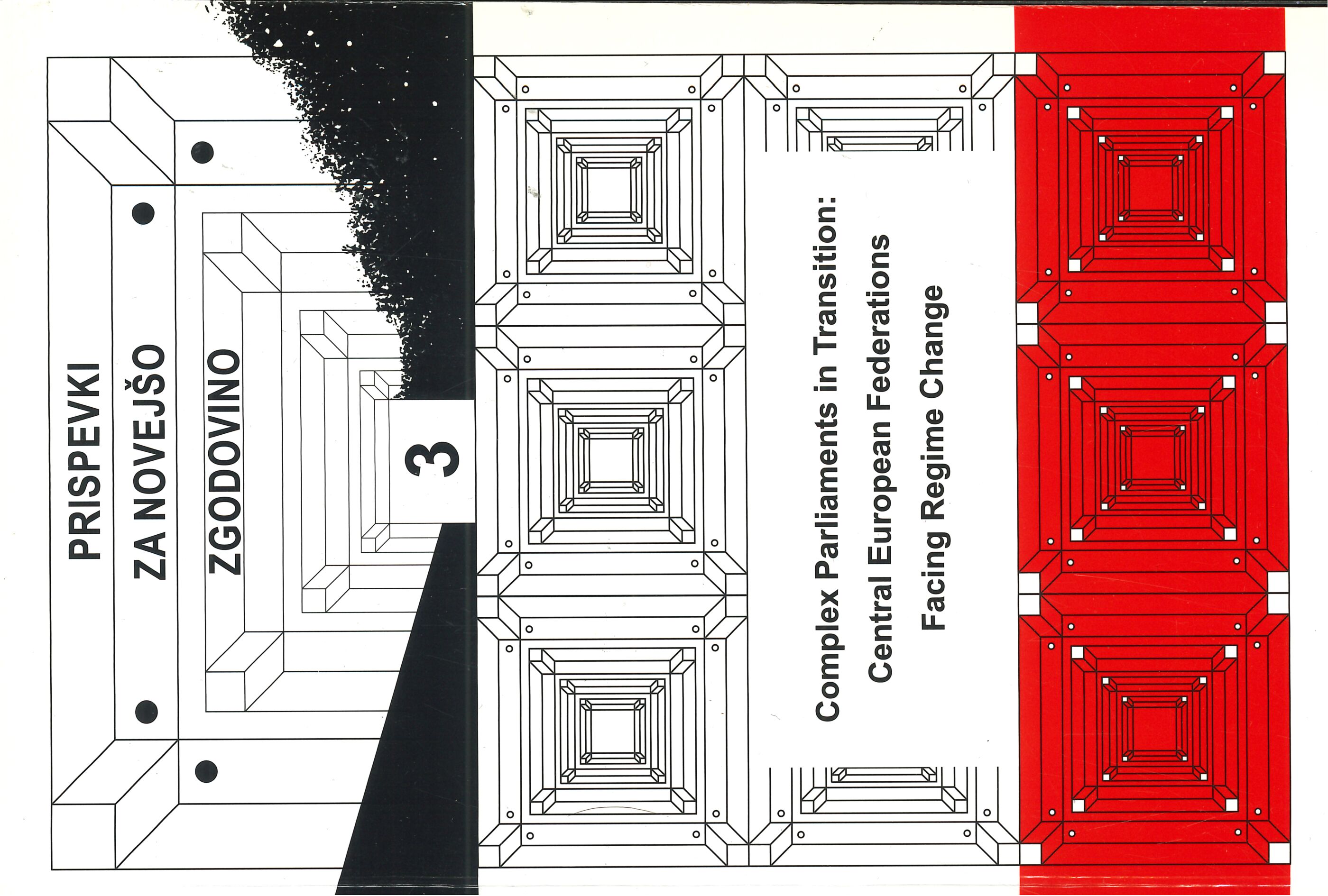Coming to (a Short) Life: The Czechoslovak Parliament 1989-1992
DOI:
https://doi.org/10.51663/pnz.55.3.01Ključne besede:
Czechoslovakia 1989-1992, Parliamentarism, Federal systems of government, Post-Communist transition, Break-up of CzechoslovakiaPovzetek
The Czechoslovak federal parliament was designed in 1968 to replace the National Assembly of a unitary state and thus formally express equality between Czechs and Slovaks in the newly established federation. After the crash of the Prague Spring reforms, the socialist parliament lost most of its sovereignty, while preserving its federal character and formal procedures, thus providing a sort of “backup” legislature. The Velvet Revolution of 1989, with its proclaimed respect to peace and legality, logically found the ancient régime’s parliament in the centre of new politics. In the revolutionary parliament of 1989-1990, the concept of socialist parliamentarianism began to clash with new motives, such as the national unity, a break with the Communist past, liberal democracy, or subsidiarity. Various blends of socialist, revolutionary and liberal democratic views of the parliament consequently came to life, while each of these concepts as well as every practical policy was perceived and accepted in conflicting manners by the Czech and Slovak publics as well as political representations. Some of these differences turned out to be irreconcilable and the federal parliament eventually played a key role in administering the break-up of Czechoslovak federation in 1992.
Literatura
Ash, Timothy Garton. We the People. The Revolution of ’89 Witnessed in Warsaw, Budapest, Berlin & Prague. London: Granta Books, 1990.
Bartuška, Jan et al. Státní právo Československé republiky. Praha: Orbis, 1953.
Bartuška, Jan. Státní právo Československé republiky. Praha: Státní nakladatelství učebnic, 1952.
Black, S. Gordon. “A Theory of Professionalization in Politics,” The American Political Science Review 3 (1970): 865-878.
Cigánek, František. “Předlistopadový parlament ve světle archivní dokumentace.” In Dvě desetiletí před listopadem 89, edited by Emanuel Mandler, 57–72. Praha: ÚSD AV ČR – Maxdorf, 1993.
“Czech Statistical Office.” Accessed October 30, 2015. http://csugeo.i-server.cz/csu/dyngrafy.nsf/graf/mzdy_1960_.
Gjuričová, Adéla. “Anti-politics and anti-parliamentarism: Václav Havel and the Czechoslovak parliament in the 1990s”. Paper presented at the conference Parlamentarismuskritik und Antiparlamentarismus in Europa, Berlin, May 7–8, 2015.
Hadjiisky, Magdalena. “Vznik občanské demokratické strany: Pokus o sociologickou analýzu.” In Kapitoly z dějin české demokracie po roce 1989, edited by Adéla Gjuričová, Michal Kopeček, 68–90. Praha – Litomyšl: Paseka, 2008.
“Interview of Josef Bartončík, Brno, Dec. 3, 2012.” In Sbírka rozhovorů s bývalými poslanci Federálního shromáždění, edited by Adéla Gjuričová, Petr Roubal, Jiří Suk, Tomáš Zahradníček. Collection of Interviews of MPs, Institute of Contemporary History, Oral History Centre.
“Interview of Štefánia Michalková, Bratislava, Nov. 15, 2011.” In Sbírka rozhovorů s bývalými poslanci Federálního shromáždění, edited by Adéla Gjuričová, Petr Roubal, Jiří Suk, Tomáš Zahradníček. Collection of Interviews of MPs, Institute of Contemporary History, Oral History Centre.
Kaplan, Karel. Národní fronta 1948–1960. Praha: Academia, 2012.
Komárek, Valtr. “Děkujeme, přijďte.” In Pocta Zdeňkovi Jičínskému k 80. narozeninám, edited by Vladimír Mikule, Radovan, Suchánek, 294–296. Praha: ASPI, 2009.
Kopeček, Michal. “Disent jako minulost, liberalismus jako projekt. Občanské hnutí – Svobodní demokraté v české polistopadové politice.” In Rozděleni minulostí. Vytváření politických identit v České republice po roce 1989, edited by Adéla Gjuričová, Michal Kopeček, Petr Roubal, Jiří Suk, Tomáš Zahradníček, 61-106. Praha: Knihovna Václava Havla, 2011.
Koranda František et al. Slovník socialistického poslance. Praha: Svoboda, 1985.
Lenin, Ilyich Vladimir. The State and Revolution: Experience of the Paris Commune of 1871. Marx’s Analysis, Chapter 3. Accessed October 30, 2015. https://www.marxists.org/archive/lenin/works/1917/staterev/ch03.htm.
Marx, Karl. Civil War in France, Chapter 5 [The Paris Commune]. Accessed Oct. 30, 2015. https://www.marxists.org/archive/marx/works/1871/civil-war-france/index.htm.
Photos of the project by Karel Prager, Jiří Kadeřábek and Jiří Albrecht. “Federal Assembly Building at Wenceslas Square, Prague.” Accessed October 30, 2015, http://www.parliamentsintransition.cz/dokumenty/federalassemblybuildingatwenceslassquareprague.
Powell, Walter W., and Paul J. DiMaggio. The New Institutionalism in Organizational Analysis. London, Chicago: Chicago UP, 1991.
“President’s Speech in the Federal Assembly, Jan. 23, 1990.” InProjevy z let 1990–1992. Letní přemítání (Spisy sv. 6), edited by Vaclav Havel, 25-43, Praha: Torst, 1999.
“President’s Speech in the Federal Assembly, May 9, 1990.” In Projevy z let 1990-1992. Letní přemítání (Spisy sv. 6), edited by Vaclav Havel, 132–136. Praha: Torst, 1999.
Rothmayerová, Gabriela. Zo zápisníka poslankyne. Bratislava: Perex, 1992.
Roubal, Petr. Starý pes, nové kousky: kooptace do Federálního shromáždění a vytváření polistopadové politické kultury. Praha: Ústav pro soudobé dějiny AV ČR, 2013.
Suk, Jiří. Konstituční, nebo existenciální revoluce? Václav Havel a Federální shromáždění 1989–1990. Praha: ÚSD AV ČR, 2014.
Suk, Jiří. Labyrintem revoluce. Aktéři, zápletky a křižovatky jedné politické krize (od listopadu 1989 do června 1990). Praha: Prostor, 2003.
Zahradníček, Tomáš. “Federalization – The Path to Demise,” Aspen Review. Central Europe 1 (2013): 25–30.
Objavljeno
Številka
Rubrika
Licenca
Avtorske pravice (c) 2015 Adéla Gjuričová

To delo je licencirano pod Creative Commons Priznanje avtorstva 4.0 mednarodno licenco.
Avtorji prispevkov, objavljenih v tej reviji, soglašajo z naslednjimi pogoji glede avtorskih pravic:
- Avtorji ohranijo avtorske pravice, reviji pa odobrijo pravico do prve objave. Delo se hkrati zaščiti z licenco za prosto uporabo avtorskih del (Creative Commons Attribution License), ki drugim osebam omogoča deljenje dela ob priznanju avtorstva in prve objave v tej reviji.
- Avtorji lahko sklenejo ločene dodatne pogodbene dogovore za neizključno distribucijo različice dela, objavljene v reviji, (npr. oddaja v institucionalni repozitorij ali objava v knjigi) z navedbo, da je bilo delo prvič objavljeno v tej reviji.
- Pred postopkom pošiljanja in med njim lahko avtorji delo objavijo v spletu (npr. v institucionalnih repozitorijih ali na svoji spletnih strani), k čemer jih tudi spodbujamo, saj lahko to prispeva k plodnim izmenjavam ter hitrejšemu in obsežnejšemu navajanju objavljenega dela (glej The Effect of Open Access).


